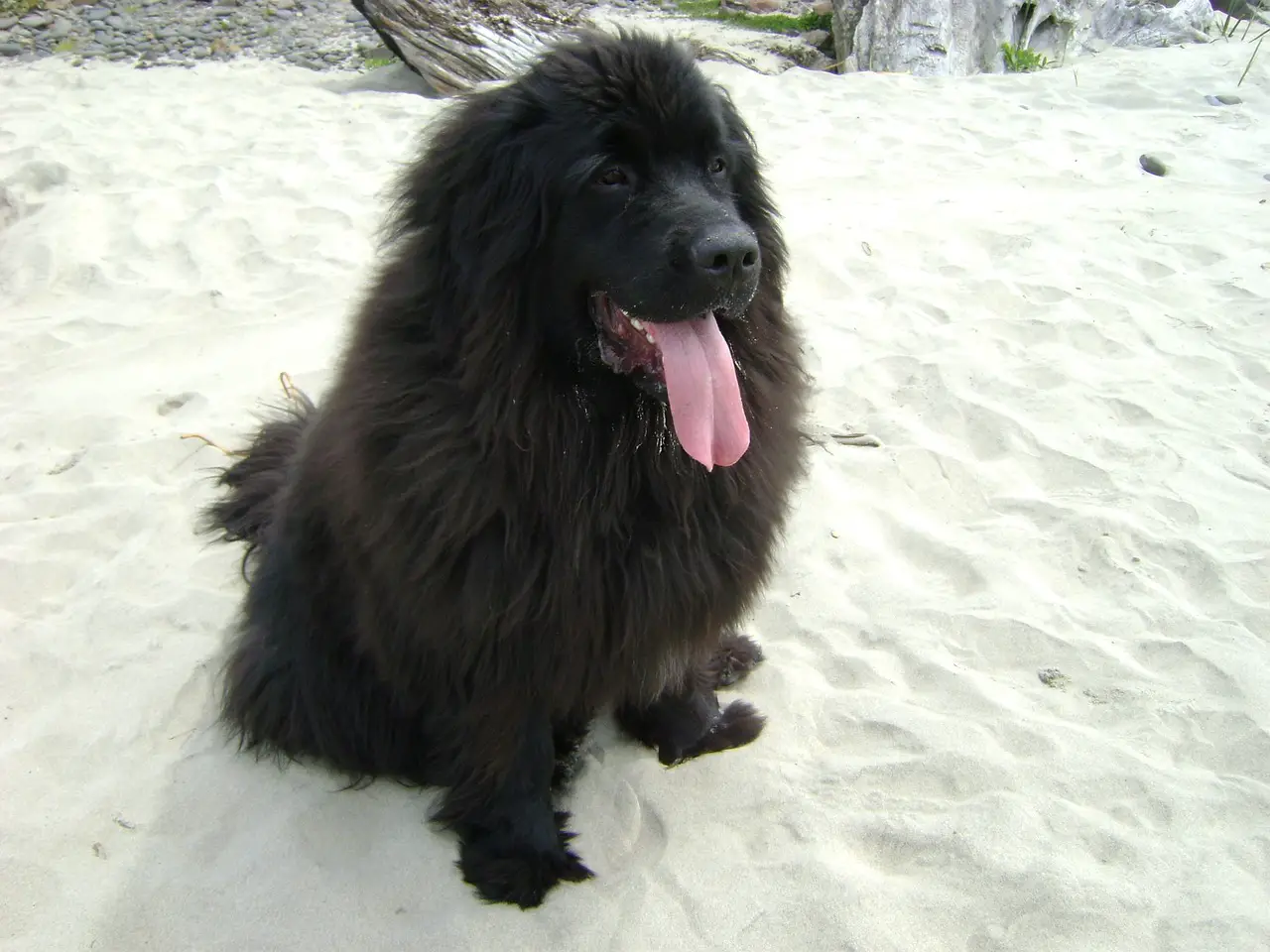Newfoundland Dog Lifespan and Common Health Issues

The Newfoundland Dog lifespan is an area that many potential owners are interested in. It’s no secret that larger, Mastiff type breeds unfortunately don’t experience the same longevity as other dogs.
The beautiful Newfie is such an impressive breed known for their massive size, strength, and sweet disposition. It’s a favourite of many larger dog lovers across the globe due to its famous charm and characteristics.
As with any breed, it’s important to understand the typical lifespan and health concerns of Newfoundland dogs in order to ensure their well-being and longevity.
If you are indeed looking to welcome a Newfie into your home, then our aim is to provide a helpful overview of common health issues affecting the breed and offer some useful tips for maintaining their long term health.
What is the Newfoundland dog Lifespan?
The average lifespan of a Newfoundland dog is 8-10 years, although some may live longer with proper care and attention.
It’s important to note that individual factors such as genetics, lifestyle, diet, and overall health can influence a Newfoundland’s lifespan.
Many members of the Mastiff family share a similar pattern to the Newfoundland dogs lifespan, whilst equally sharing common dispositions regarding health concerns. Their large, muscular frames, sensitive temperament and tendency to overheat can all be contributing factors to a shorter lifespan when compared to other breeds.
Everyday dog owners with good common-sense know that providing your Newfie with regular veterinary care, proper nutrition, and exercise can help ensure a longer, healthier life. Alongside this, owners should look to understand how their Newfie reacts to certain triggers that may cause discomfort or anxiety.
Seeking a great breeder is also something that we strongly recommend. This gives you the opportunity to quiz them on the heritage & lineage of their parents, typically you can slip in a few questions around longevity. If you manage to find a great bloodline, whilst also committing to a healthy lifestyle, you may be surprised at how much their lifespan can be extended by.
“What is the oldest Newfoundland dog? – Did you know that some Newfie’s can live to 15 years old”
Newfoundland dog Health Issues – What are the common problems?
Newfoundland dogs are generally healthy, but like all Mastiff breeds, they are prone to certain health issues. Here are some common health concerns to be aware of:
Hip and Elbow Dysplasia
Hip and elbow dysplasia are common orthopaedic conditions that affect many large breeds, including Newfoundlands. These conditions occur when the hip or elbow joint doesn’t develop properly, leading to abnormal wear and tear on the joint over time. The symptoms of hip and elbow dysplasia likely include limping, reluctance to move, and difficulty getting up and down.
Hip and elbow dysplasia can be diagnosed through X-rays and treated with medications, supplements, weight management, and surgery in very severe cases.
Good mobility is vitally important for a dog such as the Newfie, therefore we recommend trying to stay on top of this as much as possible. It may be that their love of swimming can also be a fairly therapeutic form of exercise, which offers a low impact alternative to walking and running. If you live near water, let them swim.
Again, hip and elbow dysplasia are great questions to quiz your breeder about, don’t be shy.
Heart Conditions
Newfoundlands are also prone to certain heart conditions, such as subvalvular aortic stenosis (SAS). This condition is characterised by a narrowing of the aortic valve, which can lead to poor circulation and other cardiovascular problems. Symptoms of SAS can include fainting, weakness, and exercise intolerance.
SAS can be diagnosed through echocardiography and treated with medications, surgery, and management of exercise and stress levels.
Heart problems can be triggered or exacerbated by stress and anxiety. Many dogs of the Mastiff world are more sensitive than owners may first realise. An over-stressed dog may then overheat which leads to heavy breathing.
Speaking of overheating, the Newfie originates from a colder climate (Canada). It may not handle summer well in other countries. Overheating is a common health issue that overlaps with many other larger Mastiff breeds.
The large, dense muscle and floppy, slobbery jowls make overheating a real concern for the breed. This coupled with a beautiful but thick fluffy coat. Pay attention to the temperature and do what you can to keep your Newfie cool in the summertime. That may mean air conditioning, elevated dog beds, multiple water baths and outdoor cool showers.
Bloat
Bloat, also known as gastric torsion, is a potentially life-threatening condition that occurs when the stomach fills with gas and twists on itself. This can lead to a variety of symptoms, including abdominal pain, vomiting, and difficulty breathing. Bloat can be caused by a variety of factors such as exercise, feeding habits, and temperament.
Bloat can be prevented by avoiding vigorous exercise before and after meals, feeding smaller and more frequent meals, and reducing stress levels. Treatment involves emergency veterinary care, including decompression of the stomach and surgery if necessary.
Mastiff dogs are renowned for gastric bloat. Owners can look to ease the occurrence of this by feeding them smaller meals, more regularly throughout the day. You can also add in food puzzles or different textures to help encourage them to slow down and chew their food for longer. My personal tip here is to use the odd ice cube which seems to act as a bit of a circuit breaker.
Obesity
Obesity is a common problem in many dog breeds, including Newfoundlands. As you’ll be aware, obesity can lead to a variety of health problems such as joint pain, heart disease, and diabetes.
Obesity can be prevented and managed with a balanced diet, portion control, regular exercise, and veterinary supervision.
Skin Issues and Allergies
Newfoundlands are prone to a variety of skin issues and allergies, such as hot spots, dry skin, and atopic dermatitis. These conditions can cause discomfort and itchiness, and can lead to secondary infections which may require a visit to the vet.
Skin issues and allergies can be diagnosed through physical examination and testing, and treated with medications, supplements, and special diets.
Many now think that diet plays a key role in how skin issues and allergies manifest themselves in the health of your Newfie. Choosing to eliminate foods high in preservatives, heavy grain and cereal content can help reduce inflammation.
Other Breed-Specific Health Concerns
Newfoundlands are also prone to other breed-specific health concerns such as cystinuria, which is a genetic condition that can lead to the formation of bladder stones. This condition can be managed with a special diet and medication.
Additionally, Newfoundland’s may be prone to certain types of cancer, such as lymphoma and osteosarcoma. Regular veterinary check-ups and early detection are key to managing these conditions.
Prevention and Early Detection
Prevention and early detection are critical for maintaining the health of Newfoundland dogs. Regular check-ups and monitoring can help detect potential health problems early and prevent them from becoming more serious. Here are some tips for prevention and early detection:
Regular Health Checks
Regular health checks can help identify potential health problems before they become serious. You should schedule regular check-ups with your veterinarian to monitor your Newfoundland’s health. It is also important to be aware of any changes in your dog’s behaviour or appearance, which can be early signs of health issues.
Genetic Testing
Many health issues in Newfoundland dogs are hereditary, so genetic testing can help prevent or manage these conditions. Ask your breeder or veterinarian about genetic testing options, especially for hip and elbow dysplasia and heart conditions.

Does Nutrition and Exercise Play A Role in newfoundland dog lifespan?
Proper nutrition and exercise are crucial for maintaining the health and well-being of Newfoundland dogs. A balanced diet and regular exercise routine can help prevent obesity, joint issues, and other health problems. Here are some guidelines for nutrition and exercise:
Diet
Newfoundland dogs require a high-quality diet that is high in protein and fat. Look for a dog food that contains real meat as the first ingredient and does not contain fillers or artificial additives. Avoid overfeeding your dog, as obesity can lead to joint problems and other health issues.
Exercise
Newfoundland dogs require daily exercise to maintain their physical and mental health. A daily walk, swim, or play session can help prevent obesity and joint problems. However, be careful not to over-exercise your dog, especially when they are young or if they have joint issues.
Regular Vet Check-ups
Newfoundlands require regular vet check-ups to maintain good health. Depending on the age and health status of the dog, check-ups may be required annually or more frequently. During these visits, the vet will conduct a physical examination to check for any signs of health problems. They may also recommend certain tests or procedures, such as blood work, X-rays, or dental cleanings.
It’s important for Newfoundland owners to be proactive in scheduling regular vet appointments and following through with any recommended care. Regular check-ups can help catch health problems early, when they are most treatable, and can prevent more serious health issues from developing.
Grooming and Hygiene
Proper grooming and hygiene are important aspects of maintaining Newfoundland health. Newfoundlands have a thick, double coat that requires regular brushing and grooming to prevent matting and keep the coat healthy and shiny. Regular grooming also helps prevent skin issues and allergies, which can be common in this breed.
In addition to regular grooming, proper hygiene practices are essential for maintaining Newfoundland health. This includes regular nail trimming, dental care, and ear cleaning. Good hygiene practices can help prevent a variety of health problems, including infections and other issues that can be uncomfortable or painful for the dog.
Final thoughts on Newfoundland dog lifespan and health issues
Newfoundland’s are a beloved breed with a loyal following. While they are generally healthy dogs, they are prone to certain health issues that can impact their quality of life. As a Newfoundland owner or potential owner, it’s important to be aware of these health concerns and take steps to prevent them or catch them early.
By following the tips outlined in this article, including regular vet check-ups, proper nutrition and exercise, and good hygiene practices, you can help ensure the health and well-being of your Newfoundland. With the right care, these gentle giants can live long, happy lives as valued members of your family.